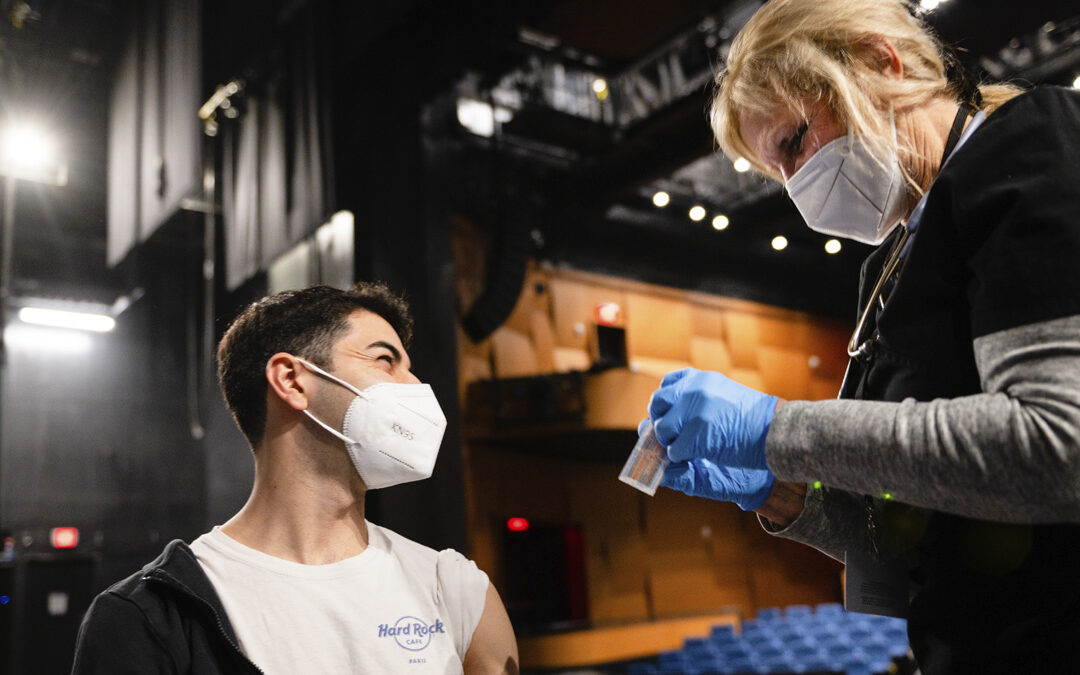Rutgers Global Health Institute is being honored by the American Repertory Ballet during a special event, the Mask-erade Gala, on March 12 at New Brunswick Performing Arts Center. The institute is being recognized for its role in helping the ballet’s dancers and dance students safely return to the studio and the stage during the COVID-19 pandemic.
Through its Equitable Recovery for New Jersey’s Small Businesses program, the institute organizes COVID-19 testing and vaccination clinics in several cities throughout New Jersey as part of a larger initiative to support the people, small businesses, and nonprofit organizations in low-income and minority communities as they navigate the pandemic’s far-reaching impacts. The Equitable Recovery program’s weekly testing clinic in New Brunswick and periodic vaccination clinics are at the performing arts center, where the ballet is a member company. As part of this collaboration, the ballet’s dancers, students, and staff are among those who have benefited from the convenient access to these public health services. The ballet’s staff members also attended an Equitable Recovery workshop that provided COVID-19 public health guidance to help local establishments operate safely and in accordance with municipal, state, and national regulations.
The ballet also is honoring Jeffrey Grosser, the deputy administrator of health and community services for the town of Princeton, New Jersey, where the ballet has a dance school, studio, and administrative offices, and Princeton Spine and Joint Center.
“These health partners have been instrumental in helping us safely navigate the ongoing pandemic,” said Julie Diana Hench, the ballet’s executive director, in a press release about the gala. “Not only do they provide access to consistent testing, but also they offer expert guidance that continues to shape our safety policies. We are incredibly grateful for the many ways they work in the community and behind the scenes to keep our dancers dancing.”
Collaborating with the New Brunswick Performing Arts Center
Rutgers Global Health Institute’s relationship with the American Repertory Ballet expanded when the institute’s Equitable Recovery program relocated its weekly COVID-19 testing clinic, which is free and open to the public, to the New Brunswick Performing Arts Center last November. The Visiting Nurse Association of New Jersey, New Jersey Department of Health, and New Brunswick City Center also are involved in organizing the testing and vaccine clinics that take place there.
The performing arts center, located on Livingston Avenue in downtown New Brunswick, has proved invaluable as an indoor and conveniently located venue for this initiative.
“Very early on in the pandemic, we learned that COVID-19 testing offered within walking distance of many points throughout the city was a critical community need,” says Richard Marlink, institute director. “We now know that many New Brunswick residents and employees of the small businesses here are walking to work and to wherever else they need to go in the city. So it became clear that providing access to COVID-19 testing that didn’t require driving was a tangible way to make an impact for the city and our neighbors.”
New Brunswick Performing Arts Center was already up and running as an Equitable Recovery COVID-19 testing site when the Omicron variant of SARS-CoV-2 created a surge in infections and ramped up the demand for testing. In December 2021 and January 2022 alone, approximately 1,200 tests were administered at the performing arts center. The Equitable Recovery program also has organized six vaccination clinics there.
“We took a responsive approach to our program, gathering input from our community partners and local stakeholders as we worked to address the needs of low-income and minority communities to help them become more resilient,” says Arpita Jindani, the Equitable Recovery program manager and an institute staff member. “In New Brunswick, which is where we started out in 2020, as well as in Newark, Trenton, and other New Jersey cities and towns in need, our main goal is to serve the people and organizations whose livelihoods depend on safe and healthy communities. Through our partners’ guidance and, quite literally, their opening doors for us, we can continue working together to get through this pandemic and come out stronger.”
Learn more about the Equitable Recovery program and the sponsors and community partners who are helping make an impact throughout New Jersey communities in need.

